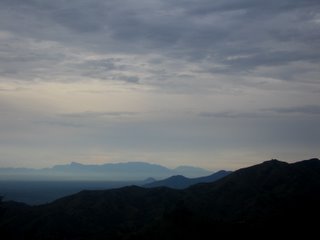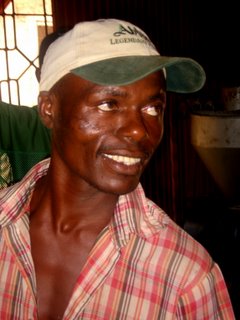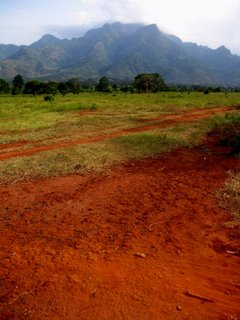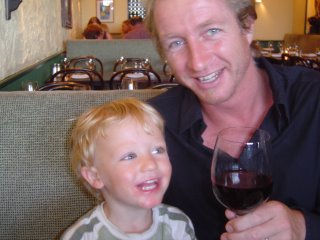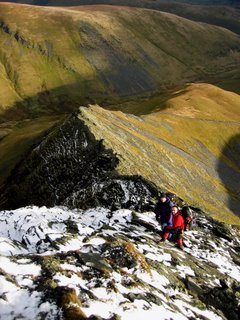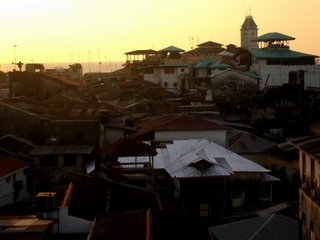
Today's talk on the Street children of Zimbabwe has brought back painfully beautiful memories of my own trips to Africa. Over the next few days I will post my African Diaries from last Years trip to Tanzania with Christain Aid....
Departure:
It is late evening, 24 February 2005, and I find myself a good mile or so nearer heaven than is normal or what I am comfortable with. I am travelling with two fellow troubadours, Marion and Robert. I don’t like to fly – the idea of such a hulk of metal staying in the air for so many hours is beyond my understanding – and consequently, over the years, a world of fear rushes into my existence every time I step inside one of these air born communities for a few hours. I have left behind a world I care about deeply, to again visit one that is part of my own and yet somehow distant and somewhat removed. A place that has become to me, in the words of Bono, the most regal of countries: Africa. Tanzania to be precise.
This morning I said goodbye to the most beloved and cherished human I know, my boy Samuel. I wept when I left him at nursery. I won’t see him for another two and a half weeks, the longest I have ever been away from him, and I don’t like the feeling. At the moment every sensation I have seems to be heightened to one degree or another. I want to feel sunlight on my face and see my boy dance, to capture the heart of life: to look existence in the face and run headlong into the mystery. I suppose I’m telling you this because of my fear of flying, and for a man who will make about 60 flights this year that is, granted, a strange confession. Still, I think it gives the majority a glimpse into a world that most of us dare not admit to let alone embrace.
What do I mean? Well, sometimes we have to look beyond the troubles of our own. We’re all lonely – the world keeps on turning even as we stand withering away – but there are so people who are not able to fight their own battles. In blunt terms, they have no voice. Actually, that’s not particularly accurate, they do have a voice, it’s just that it’s very very faint, and nobody seems to be listening – even worse most don’t even care.
We can drift away from whatever reality we choose, but eventually the wild places catch up with us, they tease our tender hearts, and beckon our goodness to recapture the souls we surely have lost. There’s a heaven on earth that so few ever find and part of our brief is to enable the rivers to be crossed and instil a lost wisdom for those outside the sheep pen of the carpenter. Where exactly are we found and where precisely blessed?
This year is a critical year for Africa. The G7 finance ministers have already met, and on July 6 the UK Prime Minister will have a unique role as he hosts the G8 summit of the world leaders. He also this year holds the presidency of the European Union. Urgent action from Mr Blair brought on through pressure from the likes of you and me could improve the lives of millions of poor people around the world who live on less than 60 pence every day. We can urge world leaders to Make Poverty History, to change the rules and practices of unjust trade, to cancel poor countries’ debts and deliver more and better aid.
Archbishop Desmond Tutu suggests that 2005 ‘is a year of great opportunity. If everyone who wants to see an end to poverty, hunger and suffering speaks out, then the noise will be deafening. Politicians will have to listen’. But without trade justice for the worlds poor, poverty will remain at the scandalous levels it is today.
When you are frozen out of all the conversation around you. When you’re only worth 10% of all your possessions then, I suppose you need some help, you need someone to be on your side, because lifetimes can’t be lived out in a day. A mournful sigh echoes in the dark 35,000 ft above North Africa as I think of the task ahead.
Arrival
I awake rather confused. I never sleep on planes. Yet somehow, miraculously even, I seem to have been out for the count for some 4 or 5 hours. I suspect though it was more to do with the numerous bottles of British Airways finest claret I consumed than a newfound karma of air travel. Either way I’m grateful (though I did miss a glorious sunrise complete with Mt. Kilimanjaro poking her head through the clouds).
Having left Heathrow an hour late due to the de-icing of our steel carriage (minus 2 degrees) we walk into a blast of hot air. It’s 7.25am and 28 degrees already. By midday it will have risen to 38. I am taken aback at how less exuberant Tanzania is compared with Ghana (maybe it’s an east coast thing). No pushing, shouting and grabbing of bags for money, just a laid back, “Jambo…jambo.” (Welcome… welcome)
After a slow ride into town we arrive at the Pembroke Hotel, rather grander than Christian Aid is comfortable with, but we’re not complaining, as we’re knackered and ready for some food and a little sleep.
After a simple and brief tour of Dar, Robert, Marion and myself find a bar and talk of what we have seen. Robert was first here 25 years ago, and is dazed at how developed Dar now is. There does seem to be a rather strange juxtaposition though. I for one started to feel a little uneasy. It’s as if (even with the development) some part of a rich culture has somehow gone missing, as if old wine had been poured into new wine skins. I think it has much to do with a language that finds itself devoid of meaning. Or as Shiva Naipaul more eloquently observes, ‘progress that has been confused with possession’.
As the first day draws to an end I sit in a bar and listen to a couple of guys serenading their captive audience of 15 with what I can only describe as a cross fertilisation of African and Cuban rhythms…I think about this as I quaff a few beers. It’s good, I conclude, to be back in Africa again.
Day 2: Zanzibar and Allah in Surround Sound
Breakfast can be a liberating experience in Africa, if you wish it to be. Beef soup and Chicken Gizzards were the dishes of my first meal, and a spicy octopus for lunch, but the most charming moment of the day came when our waitress at the Zanzibar café (which consisted of two rough wooden tables with matching benches and an old counter – slung together with such abandon we were sure was going to collapse with exhaustion any second) brought us the menu. It was hand written, meticulously well I might add, in an old school exercise book. These indeed are as my boy says, ‘happy days’.
We have a free day at the beginning of our travels and decide to visit Zanzibar before leaving for Morogoro and our partners UMADEP. Travel, for me, has always been about experience dovetailed with education, and there is much to learn about Tanzania. Scarcely a tribe of East Africa was left unaffected in one way or another from a suffering unimaginable when the slave traders arrived from Arabia backed by their European financers. They travelled many miles into the African Plains to abduct their slaves before heading back to the coast toward Zanzibar. The last stop on the mainland was (and still is) an eerie place called Bagamoyo.
Legend says that Bwagamoyo takes its name from the two Swahili words, bwaga and moyo. Bwaga means to throw down or put down, and during the long safari (journey), the leader of the group of slaves would, at certain times, shout to the other porters, “Bwaga mizigo” which means put down your loads. Moyo means heart. Bwaga moyo therefore translates to put down your heart.
As we stand at Bwagamoyo awaiting the arrival of our ferry to Zanzibar earlier this year I realised the enormity of its name. It was the place a captured slave, after his gruelling journey from the plains of East Africa, would lay down his heart, it was the place all hope was lost, because this would be the last time he would stand on the soil of his homeland before his trip to Zanzibar and a lifetime of cruelty and despair.
As evening falls I am sat on the rooftops of the Hotel International on a balmy evening with the aroma of spice filling the air as the sun gives up her fight on another day. The Stone Town of Zanzibar is a labyrinth of magical twisting streets and alleyways. It is in fact very cosmopolitan. Influences range from Indian, Asian and Portuguese to Arabian. Much of the restoration of the old town through economic liberalization came to pass as a consequence of the election of President Mwinyi in 1985; a few years later he declared it a conservation area.
Yet as I relax above the rooftops of Stone town a surprising, yet intoxicating experience is filling the air. There are in Stone Town 51 Mosques, and it seems that we have evening prayer in surround sound. At first it seemed abrupt and confusing, but as it progressed I found it most soothing, therapeutic almost. A calm had descended now devotions have come to a close, I wonder if it was the prayers or just my imagination?



